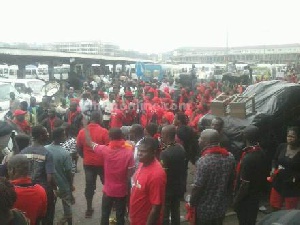More than 1000 rubber farmers in the Western and Central regions have protested against the Ghana Rubber Estates Limited (GREL) over what they term ‘the low market prices offered for their produce.’
The farmers staged a two-hour demonstration from Agona-Nkwanta to Apeminin in the Ahanta West District of the Western Region, and presented a petition to the Management of GREL and the Agriculture Development Bank (ADB).
Mr. John Cobbinah, the Chairman of the Western Rubber Farmers Association (WRUFA), told the media that GREL paid them GH¢ 1,400.00 per a tonne of rubber; instead of the world market price of GH¢ 4,000.00.
He said the monies paid to rubber tappers, agricultural extension officers and farm maintenance fees had drastically reduced their earnings with the farmers taking a paltry GH¢ 400.00 per tonne after these deductions.
He alleged that since GREL was the sole company mandated to purchase rubber produce in the country, it had taken advantage of its monopoly to cheat the farmers.
He, therefore, appealed to the Government to diversify the purchasing rights of rubber in the country so that other investors could offer competitive purchasing prices for the more than 8,000 rubber farmers in the country.
Mr. Cobbinah said that GREL contacted some farmers in 1995 and convinced them to destroy their cocoa, coconuts and palm tree plantations as well as food crops in order to grow rubber plantations and promised to offer them better market prices for their produce in order to alleviate poverty among them.
However, he said, the prices paid by GREL for the commodity over the years was not encouraging, which had plunged them into financial difficulties.
Moreover, he said, GREL also deducted the cost of shipping the commodity abroad from farmers’ earnings, while the cost of the farming inputs and equipment supplied to them were deducted in Euro values, which had made rubber farmers poorer than before.
He said the agricultural loans provided to the rubber farmers by the ADB Bank and the National Investment Bank were calculated on a Compound Interest rate of 25 per cent instead of at the 10 per cent Simple Interest Rate, as agreed upon with them initially.
“Therefore,” he said, “this situation has become a burden on the farmers and we feel cheated all these years by the banks and if nothing is done to reverse it, farmers cannot redeem the loan.”
Mr. Cobbinah explained that due to their financial constraints, the farmers currently could not pay their children’s school fees and many of their wives had threatened them with divorce.
Nana Kofi Akesse, the Kontehen of Supormu Dunkwa, who is also a rubber farmer, warned that if the prices of the commodity were not increased, the farmers would be forced to sell their produce in neighbouring Cote D’Ivoire, which offered better prices to farmers.
Mr. Perry Acheampong, the Corporate Affairs Manager of GREL, who received the petition on behalf of the Company, assured the farmers that the Company would act upon their concerns and grievances and entreated them to exercise patience.
Business News of Sunday, 27 March 2016
Source: GNA
Rubber farmers protest against GREL over earnings
Entertainment












